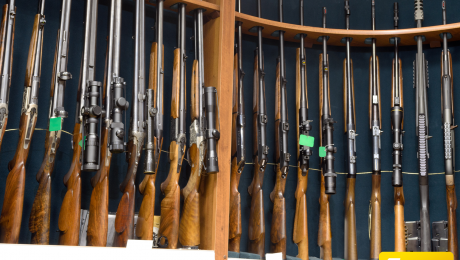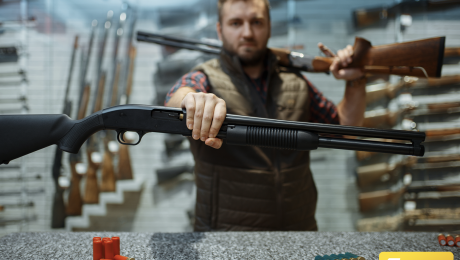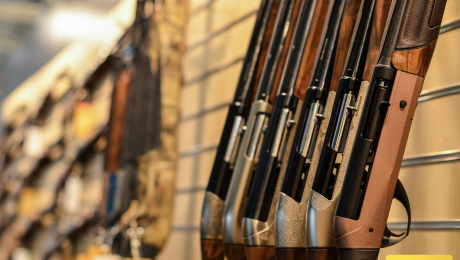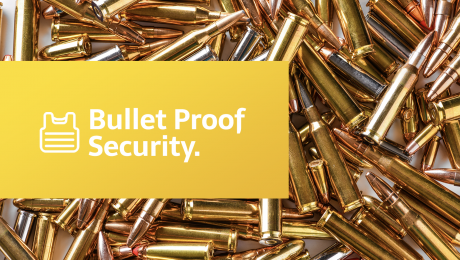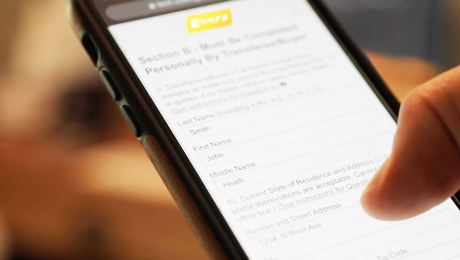How To Prepare For an ATF Inspection
Thursday, February 11 2021
A primary responsibility of the Bureau of Alcohol, Tobacco, Firearms and Explosive (ATF) is ensuring that firearms dealers engage in their business in compliance with the law. “Federal firearms licensees (FFLs) must comply with the Gun Control Act (GCA) of 1968 and its implementing regulations. This helps protect the public by preventing illegal firearm trafficking and ensuring the successful tracing of crime guns back to the first retail purchaser.” One of the ways the ATF ensures compliance is with regular inspections at limited times and for limited purposes. They may conduct an annual compliance and recordkeeping inspection under the GCA, without a warrant, once during any 12-month period. This is the ATF inspection FFLs are most likely to encounter and the one that will be addressed in this article. The Firearms Inspection Process (ATF) Inspections occur without notice at the firearms dealer’s place of business during regular business hours by an industry operations investigator (IOI). During the inspection, the IOI is responsible for the following tasks: Reviewing business operations Evaluating security measures Verifying compliance Inventorying firearms Reviewing the bound book (A&D record) Reviewing ATF forms, including Form 4473 If violations are found, the inspector reviews them with the firearm’s dealer and explains the necessary corrections. In more than half of the inspections, there are no violations and firearms licenses are revoked less than 1% of the time. In rare instances where an FFL doesn’t respond to the violations report, a warning letter or warning conference will follow. (source) Common Questions About ATF Inspections Why did they choose my gunshop? You were chosen because of where you are in the cycle of inspections. The ATF’s goal is to inspect all FFLs on a three- or five-year basis; however, a study by the USDOJ in 2013 found that the ATF did not meet its goal resulting in over 58 percent of FFLs not being inspected within 5 years. (source) The cycle you’re in depends on whether you operate in a “source” or “non-source” state; the former being those where crime guns are first purchased, and the latter where crime guns have traveled. The ATF also prioritizes high-risk FFLs for compliance inspections. If you live in a non-source state and have a low denial ratio, you’ll be inspected less often than if you live in a source state and are located in a high crime area. Why didn’t the IOI call to make an appointment? The IOI prefers to make an appointment with you because that makes their job easier. They know you’ll be at your place of business and that you’ll be prepared for their visit. But, they aren’t legally required to make an appointment. They can just show up, and as long as they do that during regular business hours, you must allow them in. What records is the ATF allowed to review? The ATF is only allowed to inspect your firearms records and inventory. They’re not allowed to inspect records related to any other aspect of your business. What happens if I have violations? “If an IOI finds violations during an FFL inspection, ATF has several ways to guide the FFL toward correcting those violations and ensuring future compliance. These methods include issuing a report of violations, sending a warning letter, and holding a warning conference (or meeting) with the industry member.” (source) But it doesn’t need to get that far. In fact, with proper preparation, you can be one of the 53% of FFLs who have no violations whatsoever. How To Prepare For An ATF Inspection Be meticulous about paperwork. This is the biggest category for ATF violations by far. The most common record-keeping violations are: Failure to document the buyer’s ID Failure to verify buyers residence Failure to record the NICS contact information Improperly identifying a firearm on Form 4473 Failure to ensure that the buyer properly completed Form 4473, Section A Buyer leaves your shop before Form 4473 is complete Discrepancies between your inventory and bound book Absence of paperwork for multiple handgun sales (source) Don’t mishandle the background check. It should go without saying, but make sure you initiate it. Then wait until the background check is completed, or the NICS time has elapsed, to transfer the firearm. Don’t sell to someone you have reason to believe is prohibited from owning a gun. If there’s a waiting period in your state, make sure you observe it. The best way to prepare for an ATF inspection is to have tools and processes that ensure that you’re in compliance on a day-to-day basis. Once you’ve been contacted by the IOI and an appointment has been made, take the time to get your records in order and make sure that everything the inspector needs is prepared before his or her visit, including a firearms inventory and an audit of your bound book. If you’re storing records electronically, make sure your variance is on hand and that the inspector can access your digital records in read-only format. Many of the most common violations occur with Form 4773. When you use E4473, you can be assured that you are 100% compliant with ATF regulations, 100% of the time.
- Published in ATF, Form 4473, Gun Stores
No Comments
Everything You Need to Know About NICS Background Checks
Thursday, January 07 2021
The National Instant Criminal Background Check System (NICS) was launched as part of the Brady Act in 1998 and is run by the FBI. The FBI website describes the mission of the NICS as “saving lives and protecting people from harm.” The goal of NICS background checks is two-fold: ensuring the timely transfer of firearms to eligible buyers and not letting firearms fall into the wrong hands (source). From November 30, 1998, to September 30, 2022, the FBI conducted 434,836,997 background checks. ATF Form 4473 is the first step in this process. As a firearms dealer, here’s everything you need to know about NICS background checks. NICS Background Check System In order to participate in the National Instant Criminal Background Check System, you first need to enroll. This involves completing the NICS enrollment form which you can find here. The fastest way to complete a background check while your customer is in the store is by using the NICS E-Check system. “FFLs who use the NICS E-Check are able to initiate an unassisted NICS background check for firearm purchases via the Internet.” It requires a separate enrollment, which can be completed here. The speed of the background check depends on which contact method you’re using. Call centers can process a background check in a little more than two minutes on average. Calls requiring further investigation take about eight minutes. Electronic processing is the fastest at just under two minutes. Whether you’re requesting the background check by phone or by E-Check, you should make sure to have all the necessary information — for all the checks you want to request — ready to go before calling or logging in. The customer service representative won’t be able to hold while you look for missing information. Here’s what you need: Sections A & B of the new 2020 Form 4473 fully completed A valid photo ID for each background check An answer of “yes” to question 21a, answers of “no” to questions 21b-21k, and answers of “no” to questions 21.1.1 and 21.1.2. (unless the transferee/customer is using a Visa, in the US temporarily, possess a valid hunting license or other qualifying exemption document). The Gun Control Act (GCA) makes it unlawful for certain categories of persons to ship, transport, receive, or possess firearms or ammunition, to include any person: convicted in any court of a crime punishable by imprisonment for a term exceeding one year; who is a fugitive from justice; who is an unlawful user of or addicted to any controlled substance (as defined in section 102 of the Controlled Substances Act, codified at 21 U.S.C. § 802); who has been adjudicated as a mental defective or has been committed to any mental institution; who is an illegal alien; who has been discharged from the Armed Forces under dishonorable conditions; who has renounced his or her United States citizenship; who is subject to a court order restraining the person from harassing, stalking, or threatening an intimate partner or child of the intimate partner; or who has been convicted of a misdemeanor crime of domestic violence. See additional details by visiting the ATF website. NICS Background Check Databases While four primary databases are searched during a NICS background check (The NCIC, the Triple I, the NICS index, and the DHS database), the FBI NICS checks searches more than 60 databases or “indexes” and checks state records which are submitted daily/weekly/monthly by state agencies. The National Crime Information Center (NCIC) is “a criminal records database allowing criminal justice agencies to enter or search for information about stolen property, missing or wanted persons, and domestic violence protection orders; to get criminal histories; and to access the National Sex Offender Registry.” The Interstate Identification Index (III) is a national index of criminal histories maintained by the FBI. It includes people who have been arrested for a serious crime anywhere in the U.S and allows states to share information on criminal activity between themselves. The NICS Index is used to determine whether or not a person is eligible to purchase firearms or explosives. The Department of Homeland Security’s Immigration and Customs Enforcement database is used when the prospective buyer isn’t a U.S. citizen. NICS Responses If the response to a background check is “proceed”, the NICS transaction number (NTN) is recorded in field 27b and the firearm is transferred. If the response is “denied”, a NICS resolution card with NTN at the bottom is provided to the customer so they can appeal. If the response is “delayed”, the NICS has three days to research and respond. Often the NICS examiner can provide a response immediately, but if there is no response after three days, the transfer of the firearm can proceed. From November 30, 1998, to September 30, 2022, 2,139,545 firearm transfers have been denied, ½ of 1% of the number of background checks conducted. Of those, 51% were due to the conviction of a crime, 10% were because the person was a fugitive from justice, and 10% were due to the unlawful use of a controlled substance. The FBI, through NICS, provides full-service background checks for 37 states, the District of Columbia, and three U.S Territories. Thirteen states act as a point of contact (POC), which means that FFLs contact the state-designated agency directly for background checks. The remaining states act as a partial POC, sharing responsibility with the FBI for background checks. A complete map of NICS participation can be found here. When a state acts as a POC, it expands the number of records that are searched. If a potential buyer has a state record that doesn’t allow the purchase of a firearm, it will be found when the state databases are searched. The federal government encourages states to share their records with the FBI, but it isn’t a requirement. The NICS Improvement Amendments Act of 2007 was passed to improve communication between the states and the feds, leading to more records available for search in the national databases. To go deeper on the details of the National Instant
- Published in Form 4473, Gun Stores, NICS
How 4473 Forms Impact Your Gun Shop
Thursday, December 03 2020
Form 4473 was established in 1968 with the passage of the Gun Control Act of 1968. That law prohibited minors, felons, and the mentally ill from purchasing a firearm. 4473 forms were required to capture the information needed to comply with the law. Since then, exclusions have expanded to include fugitives from justice, users of illegal drugs, illegal aliens, people convicted of domestic violence, and people dishonorably discharged from the armed services. It’s easy to make mistakes on Form 4473. While we don’t know exactly how many times this happens, Google searches for information about 4473 mistakes number more than 400 a month. Taking the time to fill out the form correctly can lead to long lines and impatient customers. Then, after the form is complete, there are issues with compliance, storage, and access. The existence of Form 4473 impacts your gun shop in four key ways. Customer Service As a gun shop owner, you have a community to serve. You probably have loyal, repeat customers whom you’ve known for years. You trust them and they trust you. When they come into your shop, you want to spend time serving them, not fussing over forms. That’s difficult with paper documents. But what if you had the ability for your 4473 forms to be completed on any device at any time without timeout errors? That would eliminate lines and allow you to better serve your customers. You would be secure in its accuracy because questions are displayed with definitions, and alerts are given for wrong answers. Accuracy and Compliance It’s your responsibility to ensure that Form 4473 is completed accurately. The most frequently cited FFL compliance violation is when the transferee doesn’t properly complete section A. The next most common violations are failures to record entries in the bound book on time, to follow instructions for completing the form, and to record the date NICS was contacted. Being distracted by potential compliance violations takes time and energy away from growing and managing your business. A system that could ensure 100% compliance with ATF regulations would be a load off of your mind. Storage and Logistics Suppose that you and your customer have completed Form 4473 accurately — and you know this because you’ve double and triple checked it. All you have to do is file it and forget it for 20 years, right? Not exactly. A perfectly completed Form 4473, where a transfer did occur, with its attachments does need to be kept for 20 years. But if the transfer did not occur, perhaps because it was denied after the background check, the form only needs to be kept for five years. Furthermore, incomplete transfers need to be kept in a separate file from complete transfers. Additionally, if an error is found after the transfer has been completed, the “licensee should photocopy the inaccurate form and make any necessary additions or revisions to the photocopy. The buyer/transferee should only make changes to Sections A and C. The licensee should only make changes to Sections B and D. Whoever made the changes should initial and date the changes. The corrected photocopy should be attached to the original ATF Form 4473 and retained as part of the licensee’s permanent records.” (source: ATF) Wouldn’t you rather be hunting? Access to 4473 Forms By now if you’ve done everything correctly, you’d think you were home free, but that’s not necessarily so. If, for any reason, the ATF wants or needs to audit your records, you have to make them available at a time convenient to them. The ATF is allowed to audit your records once every 12 months as part of their overarching responsibility to make sure that the industry is largely complying with statutes. If you have a system that ensures 100% compliance with ATF regulations, you don’t have anything to worry about. The only hitch is that with paper records, the inspector will need access to your place of business and your files. This can end up being a major inconvenience. But, what if you could provide uninterrupted remote access in “read only” capacity? It would be one less headache interrupting the rhythm of your business. With E4473, you can accept an electronic version of Form 4473 faster and safer than you can accept a paper form. Now there is a positive impact on your business.
- Published in Form 4473, Gun Stores
Why It’s Safer to Complete Form 4473 Online
Thursday, November 19 2020
We can learn a lot about the secure filing of digital forms from HIPAA. The Health Insurance Portability and Accountability Act requires the protection and confidential handling of protected health information (source). These regulations have spawned an immense, complex ecosystem of protocols for compliance. The consensus among experts in the field is that the electronic completion and storage of health records is the surest way to comply with the law. Because of this, firearms dealers are in good company when they decide to move their record processing online. While form 4473 is not as highly regulated as a health record, it is still considered a confidential document, with rules that must be followed for its lawful completion. “These forms are given the same status as a tax return under the Privacy Act of 1974 and cannot be disclosed by the government to private parties or other government officials except in accordance with the Privacy Act.” (source) Paper records have several security risks that are eliminated or reduced by completing and storing the records digitally. Here are seven reasons why it’s safer to process form 4473 online using E4473. The information on the form is encrypted and password protected. E4473 offers a five-tier data security protocol and 24/7 monitoring for vital attacks. Records are protected by strong login and password systems, using dual factor authentication. The platform allows for enforcing policy on secure passwords. Once completed, the form is encrypted, providing an additional layer of security. The software is regularly updated to ensure ATF compliance. We closely monitor the latest releases, regulations, and requirements of the Bureau of Alcohol, Tobacco, Firearms, and Explosives so that you are always 100% compliant with ATF regulations. The form is easy to use and protected against error. No technical skills are required to complete the form correctly. There is verification and validation of every form field on every application. Incorrect answers are flagged and help text is provided to ensure that you and your customer will not have to go back to fix mistakes later. Digital records cannot be tampered with or lost. Paper records can be lost or destroyed. They can also be altered in ways that might not be noticed. Digital records are secure from tampering, misplacement, or damage. An audit trail is created. You can easily determine who has accessed the form and when they have accessed it. That’s not possible with paper records. If your records are audited, there will be an audit trail if it’s ever needed. Only authorized people can access the form. Digitally stored records can’t accidentally be left out in the open or misfiled. Only authorized people, such as ATF inspectors, can access them. The form is backed up in case of a disaster. Records can be lost due to natural disasters, ransom attacks, criminal trespass, or human error. If any of these things happen you’ll be able to recover your documents quickly and be back in business. In addition to the many safety reasons in favor of completing form 4473 online, there are several practical ones. A paper 4473 can take more than half an hour to complete, while the electronic version — using E4473 — can be completed in minutes. Paper versions are required to be filed and kept by you for 20 years. Digital 4473’s are stored offsite, relieving you of the worry of their security and preservation. E4473 is built for mobile and can be completed on any device with an internet connection; including phone, tablet, kiosk, or computer. Want to know more? Visit our FAQ page for answers to your questions or email one of our experts at hello@e4473.com.
- Published in Bulletproof Security, Form 4473, Gun Stores
Completing Form 4473 Has Never Been Easier
Friday, November 06 2020
Lying on form 4473 is a felony. Thankfully, you’re not too likely to run into that situation. What’s much more common is having to identify and fix honest mistakes in the 75 fields that your customer needs to complete in order to make a purchase. You can spend time trying to keep your customers focused on the form, preventing distractions from other customers who just want a quick question answered, and making sure they don’t use a middle initial in Section A; or you can use E4473. It’s just that clearcut. E4473 takes everything online and makes it easy. No more bound book. No more 20 years of paperwork on file. No more babysitting customers while they complete the form. The benefits of E4473 are overwhelming and the cost is negligible in comparison. Benefit #1: Stay Compliant With E4473 you have the security of being 100% compliant with ATF regulations. We play ball by the book. E4473 keeps a close eye on the ATF’s latest releases, regulations, and requirements. Our legal team stays ahead of the curve so you can sell firearms without anxiety. The platform meets all 12 of the minimum standards for an ATF variance, including completing the form entirely in a digital environment, saving it in an unalterable format, and providing ATF with uninterrupted access to the system in “read only” capacity. Benefit #2: Enhance Security and Privacy Data privacy is a top priority with E4773. The platform offers a five-tier data security protocol and round-the-clock monitoring that’s like kevlar for your data. Dual factor authentication is the industry standard and a requirement for E4473. We are constantly on the alert for suspicious activity while keeping private information tightly locked up. This allows you to eliminate thousands of unsecured paper records and cease worrying about document storage. Benefit #3: Increase Sales to Qualified Customers Remember babysitting the customer filling out the form 4473, while other potential customers are waiting in line or trying to ask questions? With E4473 that can be a problem of the past. There are no wait times because the form is accessible on any device at any time. It’s intuitive, easy-to-use interface means even a first-timer can complete form 4773 accurately and without frustration. Multi-user capability means you, your team, and your customers can be using E4473 all the same time without errors or timeouts. Furthermore, E4473 lowers your costs by reducing the amount of time you spend completing form 4773, training your employees to execute the process correctly, and fixing errors. E4473 supports you with online video training, FAQs, and support services. It’s accuracy helps keep straw purchases out of your store so you can spend your time with your loyal, qualified customers. Benefit #4: Eliminate Form 4473 Errors E4473 digital process removes the error caused by manual processes and helps eliminate inaccuracies. Each section of our application offers questions displayed with definitions and exceptions, and there are alerts for improper answers. Best of all, it’s 100% automatic and reliable so you can keep your focus where it needs to be — on your business. Benefit #5: Reduce Paperwork With E4473, you can complete all your gun sales and transfers digitally, freeing up hours of time you used to spend on paperwork. Each firearm transaction record is stored digitally with all its attachments, eliminating hard copies and wet signatures. Benefit #6: Experience Peace of Mind E4473 is hands-down the safest way to sell firearms. It gives you the security of submitting an error-free form, compliant with ATF regulations. It eliminates the hassle of creating, storing, and retrieving paper documents. And, if you’re ever audited, the ATF can have uninterrupted access to the system in “read only” capacity and the ability to retrieve information quickly. The E4473 platform was developed to meet the needs of all firearms dealers. Whether you’re a pawn shop, small gun shop, e-commerce firearm store, or large retailer we have a solution that will make your life easier and your business more profitable. We are passionate about the right to responsibly bear arms and would love to talk to you about how you can process the form 4473 with previously unknown ease, security, and accuracy.
- Published in ATF, Bulletproof Security, Form 4473, Gun Stores
- 1
- 2

